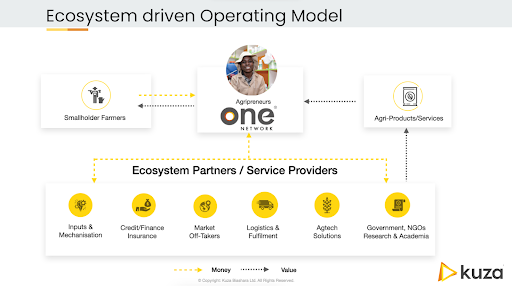Transforming Agriculture with DPI - The “Why”
Agriculture is key to the African economy and is a primary source of livelihood for most of the populations. To leverage the advancements made by DPI in recent years and to create an inclusive and innovative digital knowledge economy towards climate-resilient Agriculture, it is imperative to empower farmers with necessary tools and knowledge, along with necessary opportunities for market linkages and credit sources. This necessitates the need for a “Global DPI-based Digital Agri-transformation effort”; by enabling open & decentralised agro-networks that are underpinned by a universal suite of open protocols & data standards. Smallholder farmers produce a large part of Africa’s food supply. However, they face multiple challenges at production and marketing levels, hindering their productivity and livelihoods, including limited access to markets, agricultural inputs, credit, and technologies. Uneven access to agricultural extension services significantly hinders smallholder farmers' ability to address these challenges.
Building on the foundation of robust people-networks that exist today - The Kuza Youth Agripreneur Model
In response to this, an Agri-tech social enterprise Kuza Biashara - a smallholder farmer ecosystem management platform that leverages the last mile entrepreneurial agents to increase the income of smallholder farmers at scale, in Africa & Asia - has been at the forefront of providing innovative solutions for off-grid farmers through micro-learning, micro-distribution, and micro-mentorship. Through its Rural Entrepreneur Development Incubators program (REDI), Kuza trains young people from rural communities to become agripreneurs. Agripreneurs join Kuza’s OneNetwork, a digital marketplace, to connect with service providers and offer bundled services to smallholder farmers (e.g access to high-quality input, crop advisory, credit, and market linkages). Each agripreneur supports 200 smallholder farmers to help them boost their productivity and incomes. By actively assimilating farmer-voices through this model, Kuza has curated a massive library of content spanning across;
-
bitesized HD video-based skilling content on entrepreneurship, soft & life skills in local languages
-
good agricultural practices & climate smart technologies, regenerative agriculture practices for 40+ food crops, horticulture crops and livestock.
Kuza OneNetwork: A Connected Ecosystem for AgricultureBuilding upon the successful Kuza agripreneur model & OneNetwork, a vision for a DPI-effort in Kenya is being put forth on the table with critical sectoral stakeholders involved - incl. Ministry of Agriculture and Livestock Development, KALRO, ASNET, among others - that aims to establish an open and federated transaction network (an expanded version of the Kuza OneNetwork). The OneNetwork is envisioned to create a seamless, interconnected ecosystem - bringing together farmers, agripreneurs, traders, suppliers, financial institutions, government bodies, and consumers. Kuza is spearheading the design & deployment of the OneNetwork across Kenya, with a Beckn protocol (a global DPG for transaction interoperability) powered approach; wherein it is proposed that the Agripreneur workforce will leverage a Kuza seeker platform to connect to & transact with a host of provider side platforms in the OneNetwork ecosystem, to fulfil several use cases in Agri-advisory, Agri-credit services, Agri-marketplace services, and furthermore (*a proposed vision is illustrated below) via this OneNetwork.
This model is centred around an ambition to accomplish the following policy goals:
-
Enhanced market linkages to Agro-service providers to Local farmers
-
Seamless discovery and access of farming inputs, credit services and equipment with price transparency
-
Expanding interest among Kenyan youth to uncover rural entrepreneurship opportunities - via the “Agripreneur” model and DPI-tools like verifiable credentials (for skills & job-related efforts) and a Digital wallet.
-
Strong data observability to aid a Government’s policy-driven farming practices and enabling Government, Academia and Civil society contributions to sustained innovations in the sector.
Scaling up Kuza OneNetwork adoption Globally
Kuza’s current adoption trajectory is shaping up as follows;
-
The Kenya OneNetwork will be scaled up pan-country in ‘24-’25.
-
This OneNetwork playbook for Agriculture will be explored for;
-
expansion across the EAC region, in ‘25-26, with potentially a connected regional-marketplace in the offing.
-
Kuza plans are underway in more territories - Zambia, Zimbabwe, Ethiopia, Nigeria, Bangladesh, Nepal, Colombia, Brazil among others - with a DPI/Beckn enabled open transaction network model being a core pillar in the proposed Agri-DPI modernization strategies for those countries.
Kuza’s experience in Kenya, and other deployments in Africa & Asia - represents a unique worldwide opportunity to firmly establish & accelerate the DPI and Open Networks - in Digital Agriculture missions across the globe.
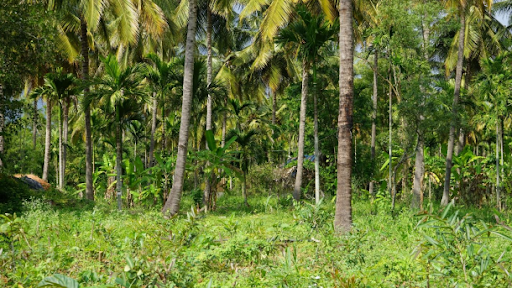
An uneven playing field
In Hasten’s work to address climate change and biodiversity loss in India, smallholder farmers tell us a consistent and bleak story – once-fertile lands are barely able to feed their families, soils are depleted, water has disappeared, the forests surrounding the farmlands are gone, and the changing weather patterns make for smaller, unpredictable harvests.
These farmers understand their current practices are unsustainable, but are unable to adopt regenerative practices due to lack of knowhow or resources. Plus, the economics of implementing regeneration doesn’t pencil out. It makes more sense for a family to cut down a tree than to leave it standing; to abandon a barren farm and migrate to the city rather than stay and restore it.
Meanwhile, a fraction of the billions of dollars invested annually in climate projects and technologies makes its way to rural communities. Global investors consider nature based investments risky for many reasons, and routinely choose “safer” bets like carbon capture machines or solar panels.
Today’s nature based climate projects are typically designed to maximize carbon capture, compromising on biodiversity outcomes and leaving communities with little income to show for their efforts. In the words of Charlie Monger, “show me the incentive, and I will show you the outcome.” is the crux of the problem; current incentives are not aligned with farmer needs. If we align incentives then we can make nature based investments much less risky than how they are perceived today. By leveling the playing field, we can accelerate humanity’s response to the climate and biodiversity crisis, and work at the required scale.
Climate & biodiversity action for all
Our vision for the Xylo platform is to enable anyone, anywhere, to take climate and biodiversity action, equitably. We give rural communities direct access to global climate markets, unlocking resources to regenerate land assets. We connect global climate capital providers directly to local climate and biodiversity action. Micro actions by millions of smallholders add up to mega impact for climate change, biodiversity loss and poverty alleviation.
Through our platform (inspired by Societal Thinking, ONDC and through collaboration with Beckn /FIDE), rural small landholders are compensated to regenerate air, soil, water, farms, and forests, leading to increased climate resilience. This benefits local communities while contributing to national and international climate action targets. Farmers are provided with knowhow and resources required to improve their land assets. They decide what and how much to invest, and how to manage the assets they’ve created, including participating directly in the global carbon markets.
The platform enables local enterprises to provide climate- and biodiversity-related products and services. Native saplings, soil amendments, planting and maintenance services, and low-cost financing are transacted; as the marketplace matures and evolves, local entrepreneurs can identify supply gaps and innovation opportunities.
An initial offer to test the platform is a “legacy forest,” a small farm forest composed of native species that creates immediate income from payments for ecosystem services, medium term income through produce, and “legacy” income through sale of carbon credits. Together with AF Ecology Centre, we’re making legacy forests available to drought-stricken farmers in Anantapur.
If you’re an NGO, philanthropy, financial institution, agri-tech provider, institutional carbon credit purchaser, or climate action enthusiast, sign up here to stay connected as we launch the platform.
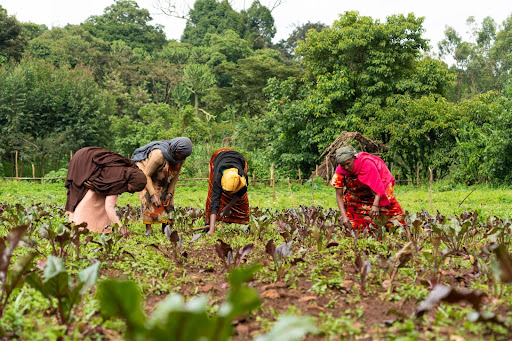
Digital Green is on a mission to transform the lives of smallholder farmers around the world. Since 2006, we've been working tirelessly to bridge the gap between farmers and vital agricultural knowledge. Today, we're celebrating our journey and looking forward to an even brighter future with the power of AI and open agricultural networks.
From Community Videos to AI Assistants: A Journey of Innovation
Our story began with a simple yet powerful idea: using community generated videos to share best practices among farmers. This approach proved highly successful, reaching millions of farmers in collaboration with our public sector partners and demonstrably improving their livelihoods. Digital Green has empowered over 6 million smallholder farmers (53% women) with innovative tools and knowledge, leading to income increases of up to 25%, and with over 70% of farmers adopting improved practices in many areas.
However, we recognized the need to deliver even better, more customized solutions to farmers so they can increase their prosperity even more.
Empowering Farmers, One Interaction at a Time
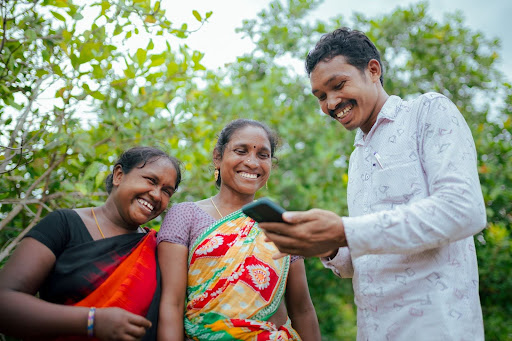
Enter Farmer.Chat, our revolutionary AI assistant for agriculture. This innovative platform goes beyond video-based learning. It provides on-demand, personalized advice tailored to each farmer's specific needs and local context. And it does so while responding in local voice, with photos, videos and text; whatever interface is best for the users.
Farmer.Chat doesn't just deliver information; it empowers farmers to make informed decisions where they weigh tradeoffs at the moment a problem presents itself. Imagine a smallholder farmer in Bihar facing a sudden pest outbreak. With Farmer.Chat, they can immediately submit a photo and ask a question, without delay and without guessing about what solution might best treat the problem.
Not only can Farmer.Chat enable real-time advice on how to identify and combat the pest, but it can also connect farmers to service providers who can provide affordable inputs to ensure their crops and incomes are growing effectively. And, once the crops are ready to sell, they can get the latest market pricing, helping them identify the best timing and location to sell to maximize profits.
Building a More Equitable and Sustainable Future
Our vision extends far beyond increased yields. We are deeply committed to:
-
Gender Equity: Closing the gender gap in agriculture by ensuring women have equal access to knowledge, resources, and opportunities.
-
Youth Inclusion: Engaging young people in the digital transformation of agriculture, connecting them to opportunities and using their innovative energy to empower communities
-
Climate Resilience: Equipping farmers with the tools and knowledge and services they need to adapt to climate change and build resilient livelihoods.
Leveraging OpenAgriNet for Global Impact
To further amplify our impact, Digital Green is actively participating in OpenAgriNet. Like the other participants in the OAN, we are convinced that the only way to support the world’s smallholders, particularly in the era of AI, is by embracing and building open-source and interoperable digital public goods. By joining this initiative, we are:
-
Sharing Knowledge and Resources: Contributing our expertise, data, and technologies to a collective pool of agricultural knowledge.
-
Collaborating with Global Partners: Working with leading organizations like CGIAR, Scio, and the UAE's Technology Innovation Institute to develop innovative solutions.
-
Advancing Climate-Smart and Gender-Equity Outcomes: Utilizing OpenAgriNet's resources to support farmers in achieving these critical goals.
A Future of Open Innovation and Collaboration
OpenAgriNet's open-source architecture enables ecosystem actors to cost-effectively reuse pooled resources, including dynamic decision support tools, local agricultural vocabulary, and model benchmarks. This fosters collaboration and innovation, leading to more effective and efficient solutions for farmers.
By participating in OpenAgriNet, Digital Green is proud to contribute to a global network that will enhance data accessibility by providing access to open datasets, including conversation logs, unstructured content, and annotated ground truth data. By coming together to develop and share fine-tuned AI models for the unique needs of smallholder farmers, we can ensure the inclusion of low resource languages and decision-support that can generate dynamic advisories. And, true to the principles of OAN, we’re excited to promote open-source development, sharing code, tools, and learnings that enable others to build upon our work.
A Bright Future for Smallholder Farmers
Through our work with Farmer.Chat and partnerships like OpenAgriNet, there is reason to be optimistic we can collectively achieve a sustainable, equitable, and prosperous future alongside smallholder farmers worldwide. By leveraging the power of AI and open collaboration, we are empowering farmers to make informed decisions, improve their livelihoods, and contribute to a more resilient food system.
This blog post was written by the Digital Green team, a collective of passionate individuals working to transform the lives of smallholder farmers by empowering them with digital technology.
In today's rapidly evolving world, the challenges we face are unprecedented, particularly when it comes to climate change and misinformation. The World Economic Forum's 2024 Global Risk Report starkly highlights this, ranking "Misinformation and Disinformation" as the top global risk, closely followed by "Extreme Weather Events." The report predicts that in a decade, climate-related risks such as "Critical Changes in Earth's Systems" and "Biodiversity Loss and Ecosystem Collapse" will dominate the global risk landscape.
As one of our esteemed partners once said, “In exponential times, if you improve your performance incrementally, you fall back exponentially.” This truth resonates deeply with us as we witness the exponential growth of Greenhouse Gases and the rapid rise in global temperatures. At the Enterprise Development Group, with a presence in Palo Alto US, the EU, and India Pacific, we are committed to tackling these global challenges head-on through disruptive innovations. Our innovation network is ever-expanding, thanks to the vision and efforts of our founders and collaborators, Herman Gyr and Lisa Friedmann. Last year we organized "Silicon Valley meets Digital Public Infrastructure Thinking" and DPI has become an integral part of our DNA. Following a groundbreaking meeting with Pramod Varma, Sujith Nair, Bala Parthasarathy, and our expert team. This meeting rekindled the spirit of innovation reminiscent of our early days in the Palo Alto garage—a place where magic happens. We welcome you to drop by and experience it firsthand!
Recent Milestones and Collaborations
Over the past few weeks, our journey has been marked by several significant achievements:
-
United Nations Climate Change Global Innovation Hub: We are proud to have our work recognized by this prestigious platform. As partners, we are in the early stages of co-creating a UN City Climate Cup, an Open Transaction Network that connects cities' demand for climate solutions with the global supply of such innovations. This initiative is driven by Massamba Thioye a visionary leader in climate action.
-
Academic Partnerships: Collaborating with the Swiss University of Applied Science Muttenz Basel, we have developed a dual-focus strategy on "Digital Health and Green Chemistry." Additionally, we are exploring private data sharing for the greater good with the German University of Passau. Academia plays a crucial role in our efforts, providing trustworthy content and engaging the youth in our mission.
-
European Digital Innovation Hub Adriatic: With the invaluable support of the Beckn Team in Bangalore, we are proposing a Renewable Energy Value Chain as partners of this EU initiative. This pan-European project, involving Croatia, Slovenia, Italy, and the Netherlands, will be powered by the Beckn Backbone, developed under the lead of Automicle. Building on top of the existing collaboration of Automicle, we are building with the Arcadis Group, led by Venkata Subbaro Chunduru we are also creating smart traffic management solutions for the US, Europe, and India.
-
Empowering Smallholder Farmers: We introduced our US and Indian partners from Xylo/ Hasten Regeneration to the DPI approach and they are now utilizing the Beckn Protocol to enable smallholder farmers in India to plant native trees, enrich soils with biochar, and connect directly with carbon buyers. The efforts of Sheeba Sen and Peter Coughlan, and the mentorship of Rajeesh Menon is fantastic. We are now in the PoC phase, check them out as they are members of OAN as well.
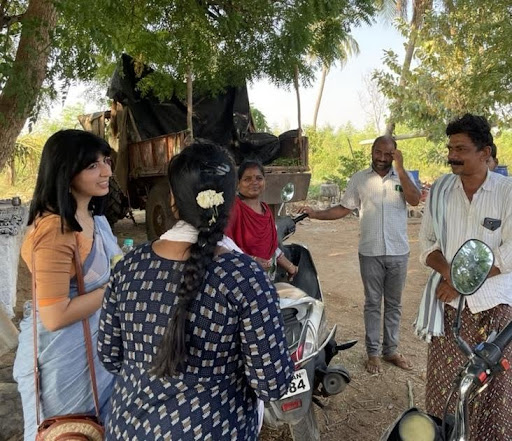
5. Autonomous Driving and Farming: We are honored to be part of the journey of, Swaayatt Robots a Level 4 Autonomous Driving Startup from Bhopal, India. Under the leadership of Sanjeev Sharma, we are exploring the use of autonomous tractors in agriculture. Please check out Autonomous Driving on Indian Roads and Indian Road Conditions- —a true testament to the idea that "if you can do it in India, you can do it everywhere."
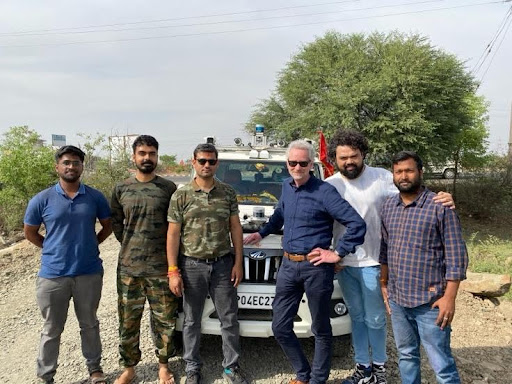
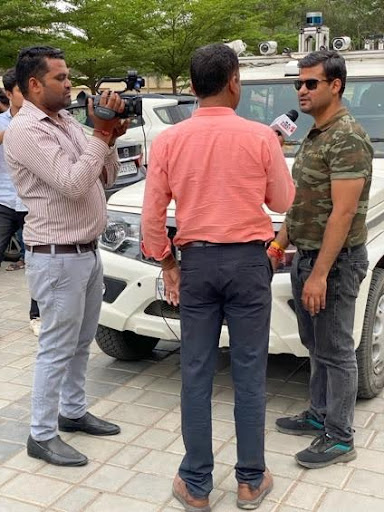
6. AI in Circular Economy: Addressing food waste in the food production is another critical focus for us. Together with VCG, we are developing an AI-driven Circular Economy model for one of the largest food retail chains in Portugal and the US.
The Future of Water Harvesting out of the Air
If these initiatives weren't inspiring enough, we recently connected with Atoco, a company that has developed a revolutionary technology for decentralized water harvesting in arid climates. Utilizing minimal or no electricity, relying mostly on natural ambient energy, Atoco innovation is a game-changer, offering a solution to the growing global water crisis. Founded by Prof. Omar Yaghi, who personally understands the challenges of living with limited access to drinkable water, this technology is poised to make a global impact.
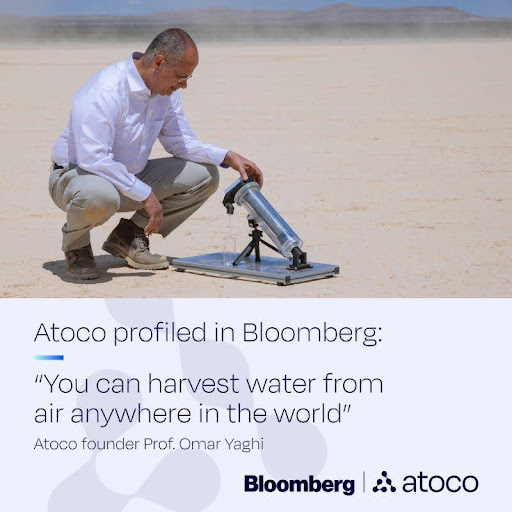
What's Next?
As we continue to push the boundaries of innovation, I want to express my deep gratitude to my partner and friend in India, Jose Jacob Kalayil, , who welcomed us into his Advisory Board of The India Advantage Summit and invited us as strategic partners.
The next exciting edition of the summit will take place on September 25-26 in Bangalore. It’s an incredible opportunity to exchange ideas and make tangible progress. Many of the projects and solutions I've described have their very roots right here, and we invite you to join us in bringing them to life.
There’s so much more to do, and the time to act is now.
Remember,” In exponential times, if you improve your performance incrementally, you fall back exponentially!”
Yours in Innovation,
Jan Kuenne
“Nomad for Innovation”
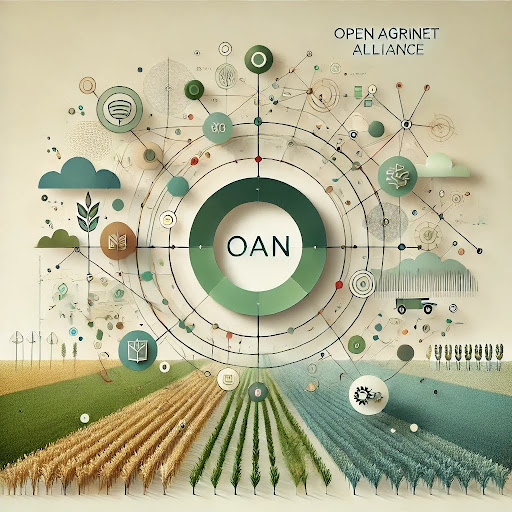
Sustainable agriculture is a critical ingredient and a primary source of livelihood for most of the populations, especially those residing in largely-agrarian economies of the Global South. Digital agriculture, especially in the Global South, faces several persistent challenges in improving farm-productivity and profitability for farmers. These include fragmentation of digital agriculture practices, limiting the efficiency and scalability of such initiatives. Each country has its own agricultural ecosystem evolving at its own pace, managing for various unique constraints. While over the years, agri-tech platforms have uniquely evolved to address the needs of the farming ecosystem, we have to think of ways to integrate various incumbent agro-platform efforts, as no one system can solve all for all challenges.
Smallholder farmers often lack access to modern technologies, timely knowledge-assets and meaningful access to markets, hindering their farm-productivity and individual profitability. For instance, there are noticeable gaps in adequate market linkages and credit sources in several geographies, thereby making it difficult for marginalised farming communities to sell their produce at fair prices and invest in necessary commodities. The sector is also highly vulnerable to adverse climate events, depleting forest-cover and soil-water conditions; thereby necessitating a pressing focus on advocating for advanced, climate-resilient practices and tools. Farmers too, as a critical “beneficiary class” are not individuals in isolation. Given the oft-seen poor income conditions, the severe stress it lays on a farming family’s livelihood needs urgent attention. If we were to look at a farmer household (as a social unit of intervention), the intervention needs are several. These include policy and funding support for maternal health, scholarship benefits and lifelong learning access for their children, social protection cover and family-subsidies, holistic health and wellness benefits for the household, water-use efficiency and so forth. Additionally, if we expand this scope to a much larger ecosystem, the policy interventions can assume possibilities of reorienting rural youth livelihood programs, streamlining the supply chains of agri-produce processing, distribution and logistics, meaningful and responsible private-market participation for sectoral modernization in tandem with Governments, among others. Thus, the aim of well ordained agri-transformation missions shouldn’t just limit themselves to siloed farmer and farm-related needs, but take a conscious view to address these challenges (and the resulting opportunities) at a much-more expanded ecosystem view. Thus the possibilities to craft new models of agri-productivity and secure economic opportunities for the farming ecosystem, are immense!
All this is possible with a reliable and scalable digital infrastructure backbone; the lack of which impedes timely information-access and innovative agri-practices. To create an inclusive and innovative agricultural economy, it is imperative to empower the farming ecosystem with necessary tools and knowledge, along with necessary opportunities for market linkages and credit sources. Enabling open & decentralised DPI & AI-powered (but augmented by a reliable human trust infrastructure) Digital Agriculture Grids are an interesting proposition to take a closer look at. As is now evidenced in a few geographies, this DPI-lens to ongoing digital agriculture efforts worldwide is aiding the consolidation of several (current) fragmented and isolated interventions and help create farming ecosystem-focused solutions at a population scale, fostering significant societal transformation at large.
The Idea
To accelerate this DPI-AI pivot to Agriculture, the “Open AgriNet (OAN)” alliance is being established as a global network of Governments, Sectoral tech-think tanks, SDOs, NPOs, Private Ag-tech organisations, research & academic institutions, among others. Through collective actions of this community, the OpenAgriNet alliance seeks to open up several avenues of access to modern technologies and knowledge assets for implementers, while also having concerted efforts around unlocking several new models of market linkages and credit sources for the farming ecosystem. It aims to mitigate the impacts of climate change on agriculture by promoting advanced, DPI-led climate-based data management tools. A key goal of the OpenAgriNet Alliance include advocating for and guiding the implementation of Digital Agriculture Grids, aided by an ambition to inculcate a culture of global cooperation to support and guide implementers in this endeavour. Thus, it seeks to establish universally-applicable agri-tech best practices; such as open and standardised protocols, data standards, open-source digital goods, cost-effective AI tooling, open data sets and operational toolkits for establishing such Grids, and so forth. The Alliance will also establish global channels of collaboration to enable inter-practitioner exchanges of best practices and innovative solutions, ultimately creating a more inclusive, efficient, and resilient agricultural ecosystem.
The Future
This pivot presents a fascinating opportunity for the global community to advance the speed and efficacy of digital agriculture innovations in the years to come. The potential that this represents uncovers several exciting possibilities over a 5-10 year horizon, some being;
-
Every in-country manifestation of the OAN blueprint presents a direct impact on 2.5 billion people, invested in the farming ecosystem worldwide. Thereby opening up new avenues for self-sufficiency and debt-free lives. Thus given the population impact, we can realistically aspire to see the gradual shift of a significant composition of LIC & LMIC nations (currently) towards middle-income status or beyond.
-
Reinventing the global focus and dialogue from “Food Security for All” to “Stabilising Food systems and Ensuring better wellbeing for All”
-
A multi-year leap in Agri-research using technology levers, and widespread on ground applications of forward looking ideas around soil & water security, remote farm monitoring and mechanisation, and so forth.
-
Unlocking new models of Agri-financing for large-scale public investments, philanthropic capital and market infusion efforts.
-
Creating a new social-tech infrastructure for Agriculture, a la “AgriOS” with underlying modular technology building blocks and widespread community contributions-uptake; to aid faster innovation cycles and value creation on-ground for the key stakeholders concerned.
-
And ultimately to establish a connecting global transactional infrastructure between nations and multilateral-regional blocs, to encourage bilateral agri-trade and unfettered information highways.
True to the spirit that this ambition holds, OAN will be a collective for all who have an active stake in modernising agriculture and food systems worldwide, for the holistic betterment of our populations.
Rajeesh Menon
Founding Member & Chief of Innovation
OAN

